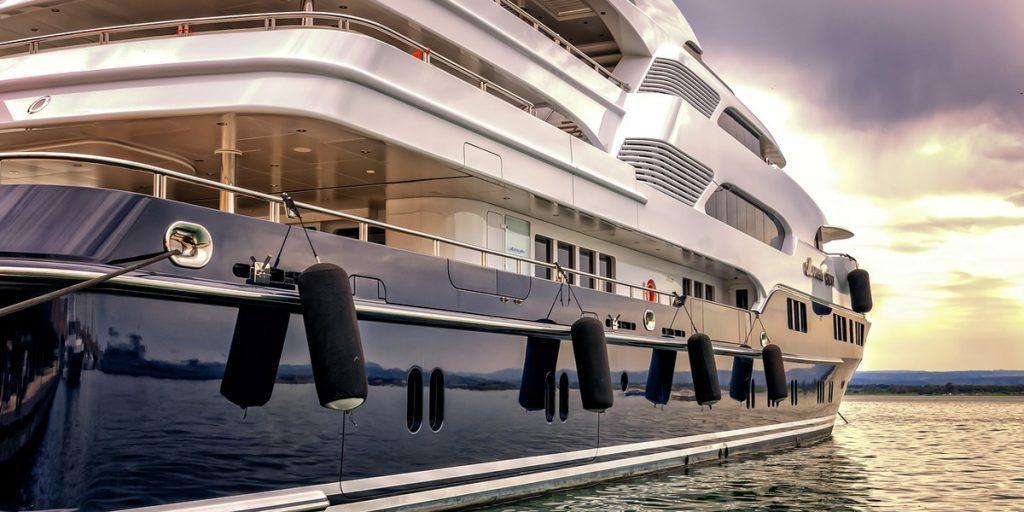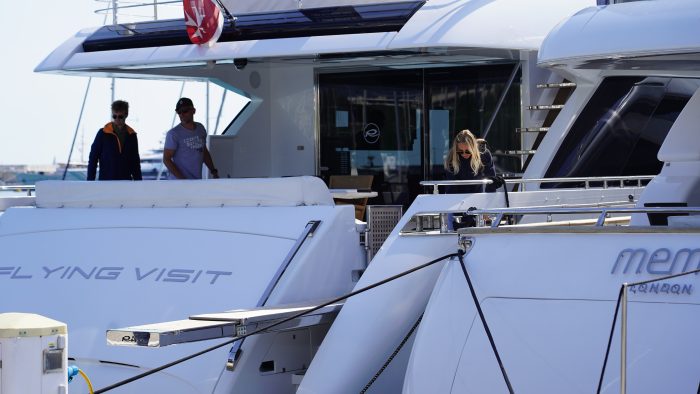Are you looking for yacht jobs but have no experience? No problem!
We’re not saying it will be as easy for you as it would be for a more experienced person, but there are still loads of opportunities if you know where – and how – to look for them.
Entry-level roles on a yacht are typically the best place to start
It goes without saying that you won’t get a job as a yacht captain if you’ve never worked on a yacht! You’ll need to set your sights a little lower at first, even if a captaincy is your eventual goal.
But don’t despair; you can still get yacht jobs with no experience – if you know how to go about it! The best place to start for most people is with an entry-level position. This most often means going for a job as a Deckhand or Stewardess.
We’d love to tell you that opportunities are blind to gender – they are supposed to be, after all – but in reality, females are far more likely to be hired as Stewardesses, and males as Deckhands.
This isn’t universal though, so once you have a job on board and have proven your value and reliability, it is easier to shift to a different position that is more in line with the career path you want.
If more senior crew members see your skills and aptitude for a different position, you’re way more likely to get it than if you demand a certain position right from the start.
Read on to discover our top tips for securing yacht jobs with no experience…
13 top tips on how to get yacht jobs with no experience:
1. Gain an edge through qualifications
Qualifications show more than just the skills they certify.
By stacking up a bunch of qualifications on your CV, you show commitment to the industry and a willingness to learn all you can, that is very impressive to a potential employer. Among the qualifications, you should start with are the STCW & ENG1 Medical.
STCW stands for ‘Standards of Training, Certification and Watchkeeping’ and STCW Basic Safety Training is a requirement for anyone who wants to work on a commercial ship – and that includes superyachts. You are required to refresh your fire fighting and Sea Survival qualifications every five years, if you are employed then the Superyacht will pay for any refresher courses.
ENG1 Medical is another mandatory certificate you’ll need to have before you can work on a commercial vessel. The ENG1 medical certifies that you are medically fit and free from any conditions that could prevent you from performing the regular duties that may be required of you.
It also reduces the chances that a medical emergency will happen when out at sea, far from hospitals and doctors. The ENG1 can usually be arranged through an MCA approved doctor, it can’t be completed by your GP. The medical can be arranged within two weeks or less, lasts for two years, and costs around £115.

2. Get all the qualifications in one place
Take our Deckhand or Steward/ess Courses; both provide all the qualifications (minus the ENG1 medical). These types of courses are an invaluable part of how to get into yachting, and even more important to getting yacht jobs with no experience.
Having taken one or more of these not only shows that you are committed, but it assures the potential employer that you have a pretty good idea of what to expect, even if you’ve never worked aboard a yacht before.
Fewer unpleasant surprises for you means fewer unpleasant surprises for your employer – and that’s great!
3. Have the right attitude
Most employers are willing to train their crew members. In fact, many employers prefer this, as they can ensure that the people they are taking on board don’t have bad habits that have to be overcome.
What they demand, however, is the right kind of attitude. These vary, but you’ll recognise them.
4. Embrace the willingness to learn
Go into every situation with an eye for something you can learn.
If you take on a new piece of information even once each day, this will cumulate into a wide and deep knowledge of your duties, the industry, the yacht you’re on, and the people you’re there to look after.
By being willing to learn, you let a potential employer know that they can get your positive experience and attributes, and add knowledge and experience to them over time. If they get the impression that you think you know it all already, they won’t take the risk on you.
5. Follow directions
Train yourself to listen carefully, listen actively, and to remember the detail. Picture actions in your head as you are being given directions.
Imagine yourself doing the actions you’re being told to do. Once you are on your own to fulfill them, you’re more likely to remember and to do the job properly.
A potential employer won’t mind so much that you’re going for a job on a yacht with no experience if he or she is confident that you will put the experience you do get to good use.
6. Know your place
It sounds a bit outdated, but there is a strong hierarchy on most sea vessels, and yachts are seldom an exception.
You will be an employee there. You don’t have to put up with abuse, but you are not going to be treated the same as the owner, the client, guests – or even more senior crew members.
By accepting that your job is to make the clients feel special and valued, and to ensure the other crewmembers that you are there to be part of a team, you show that you understand the dynamic, and won’t make any serious gaffs.
Taking pride in the service provided is perhaps rare nowadays, but with the right attitude, it is very satisfying.
Show yourself to be a high-quality provider of confident service and respect, and you’ll be perceived as a valuable asset aboard the yacht.

7. Be safe
Perhaps even more important than respect and reasonable humility is safety.
Having fun and being silly has its place, but that place is not at your interview, nor during your trial period, nor anytime that you are not 100% certain that it is within the bounds of expected behaviour.
Likewise, by displaying your knowledge of safe behaviour, you give your potential employer less to worry about. On the contrary, you’ll give off the air of being a dependable crewmember – and that’s worth a lot to a crew!
8. Be courteous
There are a lot of things that are not against the rules, but are also not the right thing to do.
There isn’t a list of them, and you won’t find a book on them, but you probably have a good idea of most of them anyway. As a rule of thumb, act toward the owner, the vessel and the crew the way you would want to be treated in each position:
- How would you want your crew to dress and to act?
- If you were the captain, what kind of response would you want to a request or an order?
- If you were the owner, how would you want the crew to address you?
When you know expectations more specifically – like the owner wants to be referred to by a formal title such as ‘your excellency’ or something similar – then you act accordingly.
Until then, do your best. Take any mistakes as learning opportunities. When in doubt, lean toward the more formal, the more courteous, and the more conservative.
This is advisable for informal meetings, job interviews, trial periods and the job in general.
9. Be professional
This term is popular, but difficult to define.
The best way to think about it is as a combination of those things we mentioned above. Be quick to learn, attentive to instructions, aware of and compliant with safety regulations and practices, and always be courteous and respectful of those you work for and with.
A more difficult part of this is to take pride in what you do, and to respect your own position, however humble it may seem in the company of captains and owners and guests. You can expect to be treated with normal human respect, not to be abused, and to be given room to learn how to do your job better.
In most cases, professional behaviour will be met with a respectful response.
10. Have the right CV
If you’re still referring to your CV as if it is one, static thing, then this is one of those learning opportunities. In reality, your CV should be almost as varied as the positions you’re applying for.
It all has to be true of course, or you’re setting yourself up for grief and failure – but a properly crafted CV will put your name at the top of the ‘possible hires’ list… and that’s what will get you your interview or trial period.
Tailor your CV to suit the position on offer. Be truthful, but highlight the things that fit what they’re looking for. Is the yacht in a very hot climate?
Show experience working or living in very high temperatures. Are you likely to be offshore for weeks at a time? Express your desire for adventure and challenge.
Always include other languages spoken, international travel, hospitality or mechanical skills, and of course any experience you’ve had on boats or ships in the past.
Look for keywords in the job description and – tactfully – add them to your CV. For example, if the advert states that it’s looking for ‘responsible’ crew, then highlight positions of responsibility you’ve had in the past.
It can be anything from childcare to responsibility closing a shop in the evenings or opening it in the mornings.
Most of all, make sure each of the advert’s ‘must-haves’ are covered. If you are missing any of them, highlight the lack but explain why another attribute makes up for it and that you are quick to learn.
If there is also an ‘also beneficial’ section, cover those too. If you skillfully tailor your CV to each job, you will show yourself to be the one they’ve been looking for all along.

11. Go to the right marina
If you picture yourself in crisp whites, striding the polished deck of a superyacht, don’t look for work at a narrow boat marina. Go where the yachts are.
You probably won’t get a position on a superyacht for your first gig, but you’ll want something similar.
Look for ocean-going experience in the luxury sector. You may need to start on the small end of the spectrum, but make sure you’re on the right spectrum!
If you can, get out to the fancy marinas and make yourself known (in a good way). In other words: network.
12. Network and get your name out there
Any time you can become known to people in the industry – from deckhands and stewardesses to captains and billionaires – you should take the opportunity to do so.
Shake hands, smile, show yourself to be clean, tidy and in possession of the right air and attitude.
Join Facebook groups of people who work in the industry. Make sure your Social Media presence is positive and that you don’t get caught up in criticising or complaining about those you want to hire (and pay) you.
Your social media should reflect all the things a prospective employer might like. In this day and age, it is very likely they will look at your profile before offering you a job.
Look for related job fairs as well; contact yacht crew agencies such as YPI Crew and Insignia Crew, or through your training centre like Flying Fish who have contacts in the industry. We take students to Antibes to find work.
13. Be flexible and willing to start anytime
The key to getting a job on yacht with no experience is to be focused on the experience – not the pay or even the type of job.
If you have a chance to get someday work, you gain items to add to your custom CV. Add a few of these and suddenly you aren’t the one with no experience anymore. A few good showings as a temporary crew can mean you’re the first one an employer calls when there is a vacancy to fill.
This willingness shows a serious drive to be a part of the industry – not simply a drive to earn some cash doing any old job. That’s the kind of person prospective employers are looking for.
Ready to find your first Superyacht job?
All the above tips should give you a solid starting point from which to search for yacht jobs with no experience! You should also download our guide to finding and thriving in your first Superyacht job below.
The next step is to complete your Superyacht training! Simply get in touch to book your place on our Superyacht Deckhand Course or Superyacht Stewardess Course today.






